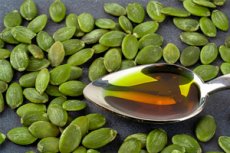New publications
Pumpkin Seed Oil Protects Prostate: Preclinical Study Shows Efficacy in Benign Hyperplasia
Last reviewed: 09.08.2025

All iLive content is medically reviewed or fact checked to ensure as much factual accuracy as possible.
We have strict sourcing guidelines and only link to reputable media sites, academic research institutions and, whenever possible, medically peer reviewed studies. Note that the numbers in parentheses ([1], [2], etc.) are clickable links to these studies.
If you feel that any of our content is inaccurate, out-of-date, or otherwise questionable, please select it and press Ctrl + Enter.

Scientists have evaluated the therapeutic potential of pumpkin seed oil (Cucurbita pepo L.), extracted on petroleum ether (CPSO), in an experimental model of benign prostatic hyperplasia (BPH) in castrated Wistar rats. The work has shown that daily intake of the oil at doses of 40 and 80 mg/kg for 28 days not only reduces prostate weight, but also normalizes metabolic and inflammatory parameters. The study is published in the journal LUTS.
Model and experimental protocol
- Animal preparation: 48 rats were castrated through the scrotum, then half of them were simultaneously administered testosterone (10 mg/kg) for 28 days to induce BPH.
- Therapeutic phase: After induction of hyperplasia, animals received daily:
- Finasteride (5 mg/kg) is the standard drug for comparison,
- CPSO-1 (40 mg/kg) or CPSO-2 (80 mg/kg) orally for another 28 days.
Control groups: healthy (without castration) and castrated without testosterone.
Main results
- Reduction in prostate weight: In rats treated with CPSO, prostate weight was significantly reduced compared to untreated hyperplasia.
- Normalization of blood biochemistry: return to normal levels of total protein, lipids, calcium and glucose; restoration of liver and kidney function.
- Reduction of hormonal markers: reduction of circulating testosterone and PSA to physiological values.
- Antioxidant and anti-inflammatory effect: a decrease in markers of oxidative stress and inflammation was noted in prostate tissue.
- Histological recovery: microscopy revealed smoothing of hyperplastic growths and regression of lesions.
Mechanisms of action
The authors attribute the protective effect of CPSO to its rich composition of polyunsaturated fatty acids, carotenoids and phytosterols, which have antioxidant, anti-inflammatory and antimitotic properties.
Significance of the study
BPH is one of the most common urological problems in men over 50 years old, traditional drugs have a number of side effects. The results of this preclinical study indicate that pumpkin seed oil may become a natural alternative or complement to existing treatments, combining safety with a multifunctional mechanism:
- Decrease in prostate tissue volume
- Improving metabolism and homeostasis
- Protection against oxidative and inflammatory damage
The authors emphasize the following points:
Multifactorial protective effect of CPSO
“We found that pumpkin seed oil not only slows prostate growth, but also simultaneously improves metabolic parameters, reduces oxidative stress and inflammation,” notes the study’s lead author.Comparison with finasteride
“At a dose of 80 mg/kg, CPSO is similar in its effects to finasteride, while having a more favorable safety profile in terms of lipid and glucose metabolism,” adds the co-author.Prospects for clinical use
“Our data provide a rationale for conducting clinical trials of CPSO in men with BPH, especially those seeking more ‘gentle’ and natural treatments,” the team leader concludes.
Next steps are long-term toxicological evaluations and clinical trials in patients with BPH to confirm the tolerability and efficacy of CPSO in humans.
